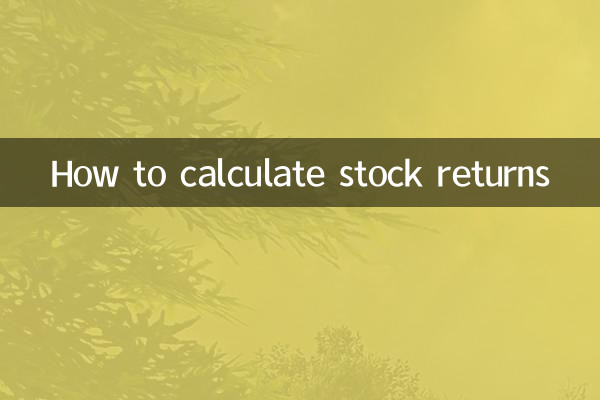How to calculate stock returns
When investing in stocks, it is crucial to understand how to calculate returns. Whether it is short-term trading or long-term holding, accurate returns calculations can help investors evaluate investment effectiveness, optimize strategies and make smarter decisions. This article will introduce in detail the calculation method of stock returns and display relevant formulas and examples in combination with structured data.
1. Basic concepts of stock returns

Stock earnings usually include two parts:Capital gains(Rewards from rising stock prices) andDividend income(Cash or stock dividends issued by the company). Here are two ways to calculate the benefits:
| Type of income | Calculation formula | illustrate |
|---|---|---|
| Capital gains | (Sell price - Buy price) × Number of shares held | Applicable to the profits caused by rising stock prices |
| Dividend income | Dividend per share × Number of shares held | Suitable for cash or stock dividends |
2. Calculation of total income
The total income is the sum of capital gains and dividend income. The calculation formula is as follows:
| Total revenue | Calculation formula |
|---|---|
| Total revenue | Capital gains + dividend gains |
3. Calculation of rate of return
The rate of return is an important indicator for measuring the effectiveness of investment, usually divided intoSimple rate of returnandAnnualized rate of return.
| Rate of return type | Calculation formula | illustrate |
|---|---|---|
| Simple rate of return | (Total income / initial investment amount) × 100% | Suitable for short-term investments |
| Annualized rate of return | ((1 + simple rate of return)^(1 / number of years of investment) - 1)× 100% | Suitable for long-term investment |
IV. Sample Analysis
Suppose that investor A buys 100 shares of a company at a price of 10 yuan per share, and sells it for 1 year after holding it for 12 yuan per share, with a dividend of 0.5 yuan per share during the period. Calculate its returns and rates of return:
| project | Calculation process | result |
|---|---|---|
| Capital gains | (12 - 10)× 100 | 200 yuan |
| Dividend income | 0.5 × 100 | 50 yuan |
| Total revenue | 200 + 50 | RMB 250 |
| Simple rate of return | (250 / 1000)× 100% | 25% |
| Annualized rate of return | ((1 + 0.25)^(1 / 1) - 1)× 100% | 25% |
V. Other precautions
1.Transaction Cost: When actually calculating the income, transaction costs such as handling fees and stamp duty must be deducted.
2.Compound interest effect: In long-term investment, dividend reinvestment will significantly increase the annualized rate of return.
3.Time factor: The yields of different holding periods vary greatly, and the appropriate calculation method needs to be selected based on the investment goals.
Through the above analysis, investors can have a clearer understanding of the calculation methods of stock returns, thereby better evaluating investment effects and optimizing strategies.

check the details

check the details